|
|
|
Sort Order |
|
|
|
Items / Page
|
|
|
|
|
|
|
| Srl | Item |
| 1 |
ID:
181860
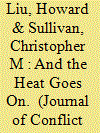

|
|
|
|
|
| Summary/Abstract |
Among security institutions, police occupy a unique position. In addition to specializing in the repression of dissent, police monitor society and enforce order. Yet within research studying state repression, how police institutions are used and deployed to control domestic threats remain under-explored, particularly as it relates to the dual functionality just described. In this study, we develop and test an explanation of police repression accounting for the bifurcation of Mann’s two modalities of state power: infrastructural power and despotic power. Infrastructural power allocates police resources to surveil dissidents and preemptively limit dissent’s emergence or escalation. Police deploy despotic power through repressive responses to political threats. Empirically, we employ unique data to investigate police repression and the modalities of power in Guatemala. To analyze how shifting the balance between infrastructural and despotic power affects police repression, we isolate damage occurring from an earthquake that exogenously reshaped the landscape of infrastructural power. Results affirm the role of infrastructural power in regulating the despotic power of the state. Where local infrastructure was most affected by the earthquake, the security apparatus lost the capacity to surveil nascent movements and predict their activity, thereby providing opportunity for dissidents to mobilize and forcing police to (over-)react rather than shutdown resistance preemptively. However, the intensity of state violence recedes as the state recovers from the infrastructural damage and regains its control of local district.
|
|
|
|
|
|
|
|
|
|
|
|
|
|
|
|
| 2 |
ID:
190725
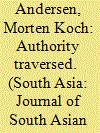

|
|
|
|
|
| Summary/Abstract |
This article is about territorial claims, authority and rights in an urban settlement or ‘bosti’ in central Dhaka. It highlights the drama of a violent encounter between a police officer and a young man, unfolding how the social ordering of urban space is (re)produced in and through authority and violence. It illustrates how situated practices of authority define who can access institutions of rights and justice, and who cannot. It concludes that claims for rights and remedies are not easy to act out when the collusion of state and non-state authority negate voice and agency and leave negotiation and equitable justice reserved for those recognised within a structure of resolution, illuminating how intimacies of violence interlink with wider political configurations and economic conditions.
|
|
|
|
|
|
|
|
|
|
|
|
|
|
|
|
| 3 |
ID:
155525
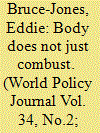

|
|
|
|
|
| Summary/Abstract |
Oury Jalloh, an asylum-seeker from Sierra Leone, burned to death chained to a mattress in a German holding cell. Eddie Bruce-Jones, a senior legal lecturer at University of London’s Birkbeck College School of Law, writes that the myriad mistakes in the investigation and prosecution of Jalloh’s case reveal patterns institutional racism that many Germans are unwilling to confront.
|
|
|
|
|
|
|
|
|
|
|
|
|
|
|
|
| 4 |
ID:
187503
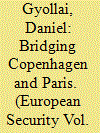

|
|
|
|
|
| Summary/Abstract |
Integrating the discursive and practice-based approach to securitisation, this article explores how the police function as the audience of securitising discourse. Taking the Hungarian case of border control, it looks into how the police accept and buy into anti-immigrant discourses of the political elite. Based on a questionnaire survey of Hungarian police officers, it demonstrates the potential of discursive legitimation in shaping officers’ understanding of mass migration. It describes the ways in which attitudes and hence, arguably, practice can be conditioned by securitising discourse. The overall aim of the article is to advance the understanding of the narrative dimension of power struggles between police and the political elite, and how that structures the field of border security. Critical security scholars have pointed out that police filter securitising discourse based on their professional dispositions and preferences. However, the Hungarian case seems to suggest that discourse may, in fact, influence dispositions themselves.
|
|
|
|
|
|
|
|
|
|
|
|
|
|
|
|
| 5 |
ID:
169998
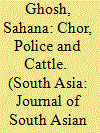

|
|
|
|
|
| Summary/Abstract |
India’s border with Bangladesh figures in the Indian national imagination as a unifying construct for multiple anxieties from illegal immigration to cattle smuggling, thus garnering public support for increased border security. What does a view from the lived and messy realities of the borderlands offer when we shift our focus from the fetish of the borderline as a political and religious marker of difference? This essay tracks the binary of legal–illegal through which cattle in the borderlands are framed, showing how bovines move across different terrains of the agrarian, the sacrificial and everyday cross-border trade in the borderlands and so resist this binary.
|
|
|
|
|
|
|
|
|
|
|
|
|
|
|
|
| 6 |
ID:
189929


|
|
|
|
|
| Summary/Abstract |
The civil-military relations literature on Turkey focuses predominantly on the guardianship role of the Turkish military, its interventions, and the role of the National Security Council as the main institutional mechanism of military tutelage. Yet, the existing studies lack a much-needed focus on the law enforcement or policing missions of the Turkish military. To fill this gap, this study discusses the EMASYA Protocol (Emniyet Asayiş Yardımlaşma or Security and Public Order Assistance), a secret protocol signed in 1997. Emerging in the context of political instability and military tutelage of the 1990s, the Protocol enabled the military to conduct internal security operations without permission from the civilian authorities. This paper argues that the EMASYA Protocol provided a sphere of “reformulated new professionalism” for the Turkish military, enabled it to specialize in the war against rising internal threats such as reactionary Islam and Kurdish separatism, and created anomalies in civil-military relations in Turkey.
|
|
|
|
|
|
|
|
|
|
|
|
|
|
|
|
| 7 |
ID:
190928


|
|
|
|
|
| Summary/Abstract |
The paper qualitatively examines the role of community policing as a panacea to insecurity in Nigeria through documentary sources. It is argued that the social and political environment in Nigeria is pervaded by the Boko Haram uprising in the North East zone, banditry and cattle rustling in the North West and North Central zones, ethnic militia in the South South and South East zones and armed robbery and ritual killings in the South West zone. Nigeria has become one of the most unsafe places to live in the world, the rate of killings suggesting that the Nigeria Police Force (NPF) – an organisation created for ensuring internal peace and cohesion – has failed in its statutory responsibilities. It is concluded that community policing which ensures the collaboration of citizens with security agents is the right approach to alleviating the internal security crisis in Nigeria.
|
|
|
|
|
|
|
|
|
|
|
|
|
|
|
|
| 8 |
ID:
160934
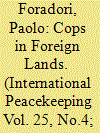

|
|
|
|
|
| Summary/Abstract |
This article analyses the role of Italy in international policing, focusing on the reasons, specific features, multifaceted character and value of its contribution. The argument is made that participation in such operations has become a distinctive character of Italy’s international projection and ideally suits its security culture and foreign policy objectives. Italy’s role is positively appraised because it responds to the international community’s demands for a more robust, specialized and highly trained police force that is needed to meet the complex challenges of the contemporary global security environment.
|
|
|
|
|
|
|
|
|
|
|
|
|
|
|
|
| 9 |
ID:
155527
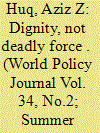

|
|
|
|
|
| Summary/Abstract |
While domestic security forces around the world equip themselves with military-grade weapons and surveillance technologies, those who research crime have reached a different consensus: To reduce lawbreaking, officers should listen to the accused, show basic courtesy, and exhibit evenhandedness. University of Chicago law professor Aziz Z. Huq concludes that the health of a country’s democracy may even depend on it.
|
|
|
|
|
|
|
|
|
|
|
|
|
|
|
|
| 10 |
ID:
133264


|
|
|
|
|
| Publication |
2014.
|
| Summary/Abstract |
After nearly seven years of ever-escalating violence related to the Mexican 'war on drugs', in 2013 Mexico entered the International Crisis Group's (icg) 'observatory' of countries facing a violent crisis. In this article we critically interrogate this 'Mexican turn' of the icg, as well as its accompanying forms of crisis knowledge production. By applying analytical insights from critical policy analysis and postcolonial security studies, we highlight the Western-centrism embedded in the icg's perspective on Mexico's security crisis. In analysing this perspective on questions of drug trafficking, statehood and indigenous justice, we demonstrate how this Western-centrism produces a de-politicising and overly technocratic crisis narrative. The article concludes that, through its Western-centric 'Mexican turn', the icg has been able to reaffirm its standing as a uniquely influential and internationally recognised crisis expert by showcasing its awareness of newly emerging crisis situations, as well as its possession of the necessary crisis-solving expertise.
|
|
|
|
|
|
|
|
|
|
|
|
|
|
|
|
| 11 |
ID:
160219
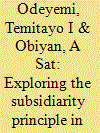

|
|
|
|
|
| Summary/Abstract |
The provisions of the 1999 Constitution, which recognises the existence of a single police force and forbids parallel police organisations, have oftentimes generated controversies among actors in the Nigerian federal polity. Rising insecurity precipitates lingering questions on the utility and adequacy of a single, highly centralised and centrally controlled police force given Nigeria’s geographic vastness and demographic diversity. Conversely, arguments have also dwelt on the dangers of fragmentation considering Nigeria’s psychosocial, economic and political nature. This article attempts to balance these arguments by analysing policing and the operations of the Nigeria Police Force (NPF) through the lens of the subsidiarity principle. Subsidiarity is a governance principle in federations, captured in the founding documents of the European Union (EU), which prescribes that governmental powers, authorities and duties should be held by the tier that can best perform them equitably, efficiently, effectively, suitably and based on interest and need. Drawing largely on interviews with purposively selected police scholars, political actors, civil society organisations and police personnel, the paper contends that this principle offers a pragmatic solution to the perennial problems of intergovernmental frictions on the use of the police within the context of governance in the Nigerian federation.
|
|
|
|
|
|
|
|
|
|
|
|
|
|
|
|
| 12 |
ID:
136708
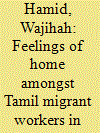

|
|
|
|
|
| Summary/Abstract |
Low-wage Tamil migrant workers have long been contributing to Singapore. Despite labouring for three decades and being connected to the existing Tamil diasporic community in Singapore, they have been left out in both state rhetoric and society, often due to claims of transience. Conversely, a fatal traffic accident in the locality of Singapore’s Little India in December 2013 involving a Tamil migrant issue_images_88_1_Hamid_Figure11worker that morphed into a ‘riot’ has again brought these men and their presence within the vicinity of Little India to the fore. This paper uses the concept of “transnational home” as a lens to study their everyday experience in Singapore’s Little India. The homely feelings experienced by the migrant workers highlight their feelings of homesickness vis-à-vis the need for a sense of belonging felt amongst transnational male migrant workers. On the other hand, practices that make the space unhomely for them not only illustrate their social position but will also contribute to the study of the governmentality of migration and control of migrant bodies.
|
|
|
|
|
|
|
|
|
|
|
|
|
|
|
|
| 13 |
ID:
185071
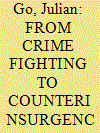

|
|
|
|
|
| Summary/Abstract |
The Special Patrol Group (SPG) of the London Metropolitan Police was formed as a crime-fighting unit in 1965. Beginning in the early 1970s, however, it underwent a transformation of ‘colonial counterinsurgenization’. The SPG shifted its initial role and increasingly took on the characteristics of a colonial counterinsurgency police force operating in the metropolis. The change is seen in the SPG’s approach to public order policing and crime prevention, especially in London’s African-Caribbean communities. The new counterinsurgency tactics of the SPG in those communities in turn generated the conditions for the very sorts of metropolitan uprisings the SPG had sought to subdue.
|
|
|
|
|
|
|
|
|
|
|
|
|
|
|
|
| 14 |
ID:
077388
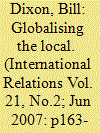

|
|
|
|
|
| Publication |
2007.
|
| Summary/Abstract |
A framework for analysing policy transfer developed by David Dolowitz and David Marsh has begun to attract the attention of criminologists interested in understanding how crime policies travel. This article uses this framework to assist in tracing the genealogy of a style of local, geographically responsible `sector' policing which is currently being implemented by the South African Police Service. After locating sector policing as a distinctive approach within the broader tradition of community policing, the article considers the origins and development of geographically responsible policing in Great Britain and the United States before focusing on its adoption and adaptation in post-apartheid South Africa. Answers to the seven questions suggested by Dolowitz and Marsh's framework are then sought in an effort to understand more fully the genealogy of sector policing in South Africa and the role of international policy transfer in it.
|
|
|
|
|
|
|
|
|
|
|
|
|
|
|
|
| 15 |
ID:
185886
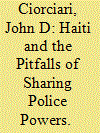

|
|
|
|
|
| Summary/Abstract |
This article examines the benefits and pitfalls of international policing in Haiti over the past quarter century. It shows the importance of the political foundations for joint policing arrangements. Haiti's experience illustrates that international personnel can provide useful stopgap policing services when the interests of national and international partners converge around public order crises. However, the Haitian case also shows how weak political commitment on one or both sides can lead to vague mandates, poor cooperation in the field, weak police accountability, and stalled domestic reforms. These problems have undermined the performance of international personnel and the Haitian National Police, eroding public trust in both. Ultimately, international intervention has failed to yield a capable, trusted, and apolitical Haitian police force or a notably stronger rule of law. Haiti thus offers a cautionary tale for international policing.
|
|
|
|
|
|
|
|
|
|
|
|
|
|
|
|
| 16 |
ID:
185665
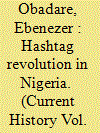

|
|
|
|
|
| Summary/Abstract |
Exploding in October 2020 and reverberating internationally, protests against police brutality under the hashtag #EndSARS exposed enduring patterns and emergent trends in Nigerian politics and society. This article examines various elements of the protests to advance hypotheses about the culture of social media, the weakening of old forms of solidarity, and the rise of a new generation of activists steeped in new rules and technologies of civic engagement. #EndSARS marks the possible ascent of an inorganic civil society with profound implications for Nigerian democracy.
|
|
|
|
|
|
|
|
|
|
|
|
|
|
|
|
| 17 |
ID:
188792
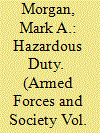

|
|
|
|
|
| Summary/Abstract |
The link between military service and crime has been a subject of investigation for several decades. Although research has examined the likelihood of arrest, incarceration, and recidivism across military cohorts, relatively little is known about the circumstances surrounding police contact and suspect behavior at the exact moment of arrest. This is a critical oversight given that what transpires during an arrest can have a marked impact on downstream criminal justice outcomes, including access to diversionary programming like veterans treatment courts. Using a nationally representative survey of prison inmates, this study analyzes veteran and nonveteran self-reports of their arrest controlling for a host of relevant demographic, mental health, and criminal history variables. Findings indicate that veterans are significantly less likely to resist the police at arrest. These results provide further support to the sentiment that military culture and training can have a lasting behavioral influence on those who experience it.
|
|
|
|
|
|
|
|
|
|
|
|
|
|
|
|
| 18 |
ID:
167826
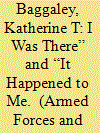

|
|
|
|
|
| Summary/Abstract |
Various theoretical frameworks have been applied in an attempt to understand the phenomenon of killing. While previous studies have examined killing as an outcome-oriented measure, few have explored killing as a narrative. Using letters written by soldiers, police officers, and security professionals found in the magazine Soldier of Fortune, this study examines the reported behaviors that occur during the killing process and argues that the process of killing is best understood as an adventure narrative. Applicability of findings to other homicides is discussed.
|
|
|
|
|
|
|
|
|
|
|
|
|
|
|
|
| 19 |
ID:
102081
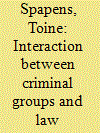

|
|
|
|
|
| Publication |
2011.
|
| Summary/Abstract |
The police and the policymakers in the field of organised crime generally assume that criminal groups are very flexible in their responses to law enforcement intervention. They use this flexibility to explain why some forms of organised crime are very difficult to curb. Criminal groups may also develop more effective protection methods over time. Another explanation may be that others are quick to replace apprehended members of criminal groups, or even an entire criminal group that has been dismantled by law enforcement officials. This article addresses these questions empirically by examining the behaviour of criminal groups producing and trafficking ecstasy in the Netherlands between 1997 and 2006. It concludes that such groups were able to adapt to the methods and tactics used by the Dutch police to some extent. The main explanation for the continued production of ecstasy, however, is that criminal groups are replaced by new ones.
|
|
|
|
|
|
|
|
|
|
|
|
|
|
|
|
| 20 |
ID:
121200
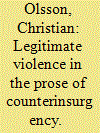

|
|
|
|
|
| Publication |
2013.
|
| Summary/Abstract |
Drawing on a critical engagement with the claims made by (and interpretations of) the 2006 US army and marine corps field manual on "Counterinsurgency," this article engages some of its underlying concerns with the problematic relation between violence, legitimacy, and political order. Since this manual draws heavily on many commonplaces of contemporary political science, the analysis explores their problematic presuppositions and the ways in which they play out in contemporary warfare. The primary conclusion is that while the encounter of legitimacy and violence is claimed by the doctrine to produce and maintain political order, its framing of this encounter is deeply rooted in a specific political order, that of the modern state, which severely constrains the conditions under which this encounter can take place. These constraints cast serious doubts on many of the doctrine's assertions, especially as they have shaped recent wars in Afghanistan and, until recently, in Iraq.
|
|
|
|
|
|
|
|
|
|
|
|
|
|
|
|
|
|
|
|
|